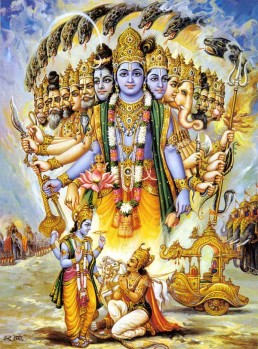Swami Chinmayananda
Swami Chinmayananda Commentary
Indicating by a familiar idiom in Sanskrit, “So be it” (evam-etat), Arjuna accepts the technical thesis that has been declared by the Lord. Intellectually, it has been satisfactorily proved that the Lord is immanent in all names and forms. Still the intellect awaits the baptism of a demonstration. Therefore Arjuna says, “I DESIRE TO SEE YOUR ISHWARA-FORM.” He is Ishwara who in Himself, expresses omnipotence, infinite wisdom, strength, virtue and splendour; these are the six qualities that are described in our shastras as forming the characteristic features of the God-principle.
This was the occasion on which Krishna decided to show to Arjuna that the LORD IS NOT ONLY IMMANENT in all forms, but He is also the vehicle or receptacle in which all names and forms have their existence and play — HE IS ALSO TRANSCENDENT.
Though, with the enthusiasm of a fanatic believer in intellectualism, Arjuna demands a demonstration, he immediately realises that his audacity has, perhaps, crossed the frontiers of decency.
HE IS TRYING TO SMOOTHEN HIS WORDS OUT IN THE FOLLOWING STANZA:
Adi Sankara Commentary
Parama-isvara, O supreme Lord; evam, so; etat, it is-not otherwise; yatha, as; tvam, You; attha, speak; atmanam, about Yourself. Still, purusottama, O supreme Person; iccahmi, I wish; drastum, to see; the aisvaram, divine; rupam, form; te, of Yours, of Visnu, endowed with Knowledge, Sovereignty, Power, Strength, Valour and Formidability.
The Bhagavad Gita with the commentary of Sri Sankaracharya – Translated by Alladi Mahadeva Sastry
Holy Geeta – Commentary by Swami Chinmayananda
The Bhagavad Gita by Eknath Easwaran – Best selling translation of the Bhagavad Gita
The Bhagavad Gita – Translation and Commentary by Swami Sivananda
Bhagavad Gita – Translation and Commentary by Bhaktivedanta Swami Prabupadha
Srimad Bhagavad Gita Chapter 11 – Verse 3 – 11.3 evam etadyathattha – All Bhagavad Gita (Geeta) Verses in Sanskrit, English, Transliteration, Word Meaning, Translation, Audio, Shankara Bhashya, Adi Sankaracharya Commentary and Links to Videos by Swami Chinmayananda and others – 11-3

